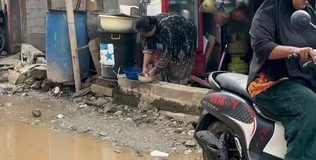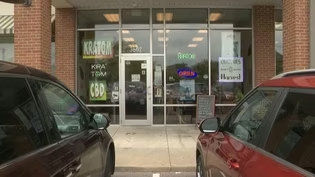
Study suggests risk of pediatric cancer from medical imaging
Clip: 11/9/2025 | 5mVideo has Closed Captions
New study suggests link between medical imaging and pediatric cancer risk
Medical imaging, like X-rays and CT scans, are routine, non-invasive and painless tools used by doctors to make diagnoses. But a recent study of about 4 million children published in the New England Journal of Medicine suggests that the radiation exposure from imaging could pose a risk for pediatric cancer. John Yang speaks with Dr. Rebecca Smith-Bindman, the study’s lead author, to learn more.
Problems playing video? | Closed Captioning Feedback
Problems playing video? | Closed Captioning Feedback
Major corporate funding for the PBS News Hour is provided by BDO, BNSF, Consumer Cellular, American Cruise Lines, and Raymond James. Funding for the PBS NewsHour Weekend is provided by...

Study suggests risk of pediatric cancer from medical imaging
Clip: 11/9/2025 | 5mVideo has Closed Captions
Medical imaging, like X-rays and CT scans, are routine, non-invasive and painless tools used by doctors to make diagnoses. But a recent study of about 4 million children published in the New England Journal of Medicine suggests that the radiation exposure from imaging could pose a risk for pediatric cancer. John Yang speaks with Dr. Rebecca Smith-Bindman, the study’s lead author, to learn more.
Problems playing video? | Closed Captioning Feedback
How to Watch PBS News Hour
PBS News Hour is available to stream on pbs.org and the free PBS App, available on iPhone, Apple TV, Android TV, Android smartphones, Amazon Fire TV, Amazon Fire Tablet, Roku, Samsung Smart TV, and Vizio.
Providing Support for PBS.org
Learn Moreabout PBS online sponsorshipJOHN YANG: Medical imaging, like X-rays and CT scans, are a routine, non-invasive, and painless tools for doctors to make diagnoses.
But a recent study of about four million U.S.
and Canadian children published in the New England Journal of Medicine, suggests that the radiation exposure from imaging could pose a risk.
It estimates that about 10 percent of blood cancers like leukemia and lymphoma, in the study group, may have been attributable to radiation exposure from medical imaging.
Dr.
Rebecca Smith-Bindman is the lead author of the study and she's a professor at the University of California, San Francisco.
Dr.
Smith-Bindman, is this the first time first study to focus on children and in such a large scale?
DR.
REBECCA SMITH-BINDMAN, University of California, San Francisco: It is.
It's the first study that looks at children and all kinds of medical tests that they observe.
And then we follow those children for a long period of time.
We added up the cumulative dose of radiation from all those tests, identified which children were diagnosed with hematologic cancer to allow us to estimate the risks of those exams.
JOHN YANG: Are children particularly vulnerable to exposure to radiation?
REBECCA SMITH-BINDMAN: They are.
They're vulnerable, we think, for two reasons.
First, because they have a long life expectancy in front of them and the risk of developing a cancer from radiation is cumulative over time.
And the risks last a whole lifetime.
But also, their cells are rapidly dividing, they're growing and that makes them particularly vulnerable to the kind of damage that's caused by the radiation.
JOHN YANG: The studies I understand it said that even low levels of radiation from one or two CT scans can increase the risk.
What's the significance of that?
REBECCA SMITH-BINDMAN: It's not just CT scans that increase the risk.
It's all kinds of radiation.
So we use radiation from all different kinds of medical tests, from radiographs like you would get for a bone fracture or to look for pneumonia, all the way up to higher dose studies like fluoroscopy or CT scans.
And we found that the risk of hematologic cancer, even at relatively low doses, is increased.
So it really underscores the need to minimize radiation.
JOHN YANG: Are doctors overusing medical imaging?
I mean, it becomes fairly standard in my experience to do either an X-ray or even a CT scan very early on.
REBECCA SMITH-BINDMAN: I think that's a really important point.
And I think what our research highlights is the need to justify every exam that uses radiation.
And on top of that to make sure that the doses we use for those exams are as low as possible.
We're hoping to learn something from this exam and not to sort of just get the exams because we can.
Parents really need to be informed that the medical imaging could really help their child, but it also could be unnecessary.
And so really to think very carefully every time an exam is ordered and every time you ask for an exam.
JOHN YANG: Are there guidelines about this?
Guidelines the physicians have to follow or if they're not, should there be?
REBECCA SMITH-BINDMAN: I think we need more rigorous guidelines that really help guide what tests we do in different circumstances.
I can give you a concrete example.
We know that to diagnose appendicitis, we could use ultrasound instead of CT scans.
And for younger children, we often do start with ultrasound.
And in older children, we often go right to CT, which has much more radiation than, you know, even just getting some kinds of radiographs that are necessary.
So we need much more explicit guidelines and we need to do a better job as physicians of following those guidelines and avoiding the higher dose studies if it's possible.
JOHN YANG: You mentioned earlier parents.
What should parents think about?
What should parents do if a doctor suggests or orders medical imaging for their child?
REBECCA SMITH-BINDMAN: So I think it's a -- it's a little bit of a nuanced situation.
Parents should absolutely not refuse medical imaging, but I think they can open a dialogue and ask, do we really need this test?
I'll give you an extreme example.
The child was in the car accident and has severe injuries.
You need to do the CT scan and you need to do it right away.
So it's circumstances like that.
You just get the scans.
In other situations, the doctor orders a test in an outpatient setting.
I think it's appropriate for the parents to discuss it with the physician.
Do we really need the test?
Do we need the test now?
And if we do need a test now, is it possible to replace a radiation-based test with a non-radiation-based test such as MRI or ultrasound that doesn't use ionizing radiation and doesn't increase the risk of cancer?
So I think it's that dialogue that's so important.
JOHN YANG: Dr.
Rebecca Smith-Bindman of UCSF, thank you very much.
REBECCA SMITH-BINDMAN: Thank you so much for covering this important topic.
How the loss of USAID affects Indonesia’s climate fight
Video has Closed Captions
Clip: 11/9/2025 | 3m 57s | How the loss of USAID funding affects Indonesia’s ability to fight climate change (3m 57s)
News Wrap: Senate works over weekend as shutdown continues
Video has Closed Captions
Clip: 11/9/2025 | 2m 28s | News Wrap: Senate works through weekend as shutdown enters 40th day (2m 28s)
UNICEF: Children face ‘horrific violence’ in Sudan crisis
Video has Closed Captions
Clip: 11/9/2025 | 5m 33s | Children exposed to ‘horrific violence’ in Sudan’s civil war, UNICEF says (5m 33s)
Why regulators want to ban a key ingredient in kratom drugs
Video has Closed Captions
Clip: 11/9/2025 | 6m 34s | Why regulators want to ban a key ingredient in kratom, a popular herbal supplement (6m 34s)
Providing Support for PBS.org
Learn Moreabout PBS online sponsorship
- News and Public Affairs

FRONTLINE is investigative journalism that questions, explains and changes our world.

- News and Public Affairs

Amanpour and Company features conversations with leaders and decision makers.












Support for PBS provided by:
Major corporate funding for the PBS News Hour is provided by BDO, BNSF, Consumer Cellular, American Cruise Lines, and Raymond James. Funding for the PBS NewsHour Weekend is provided by...



